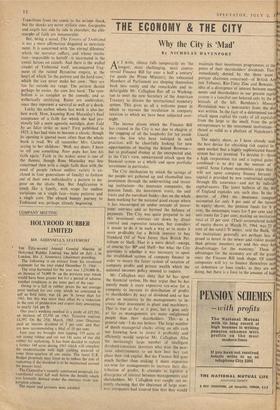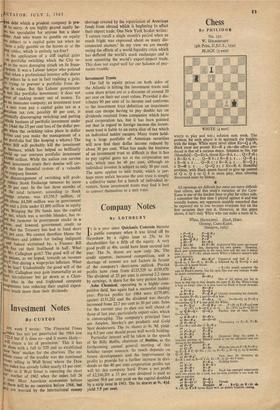THE ECONOMY & THE CITY
a
et
Why the City is 'Mad'
By NICHOLAS DAVENPORT'
AI write, silence falls temporarily on 'the longest, most challenging, most contro- versial Finance Bill for over a half a century' (to quote the Prime Minister), the exhausted Members of Parliament are sleeping themselves back into sanity and the remarkable and in- defatigable Mr. Callaghan flies off to Washing- ton to meet the new Secretary of the American Treasury to discuss the international monetary system. This gives us all a welcome pause in which to reassess the revolution in company taxation to which we have been subjected over- night.
The intense gloom ,which the Finance Bill has created in the City is not due to chagrin at the stopping of all the loopholes for tax ,avoid- ance—the few who have indulged in such practices will be cheerfully looking for new opportunities of beating the Inland Revenue— but to profound dismay at the unexpected and, in the City's view, unwarranted attack upon the financial system as a whole and upon portfolio investment in particular.
The City mechanism by which the savings of the people are gathered up and channelled into investment through the underwriting and invest- ing institutions—the insurance companies, the
• pension funds, the investment trusts, the unit trusts and the merchant banks—has on the whole been working for the national good except where it has encouraged an undue amount of invest- ment overseas and so harmed the balance of payments. The City was quite prepared to see this investment overseas cut down by direct control and repressive taxation, but considers it insane to do it in such a way as to make it more profitable for a British investor to buy Standard Oil of New Jersey than British Pet- roleum or Shell. That is a mere detail—except, of course, for BP and Shell -but what the City questions is whether it was necessary to upset the established system of company finance in order to secure the fairer system of taxation of company profits and private wealth which the national incomes policy seemed to require.
Mr. Callaghan may deny that he has upset the financial system, He may argue that he has merely made it more expensive tax-wise for a company to increase its distribution of profits to shareholders by way of dividend and so has given an incentive to the managements to in- crease their investment in plant and machinery. That is true as far as it goes, but it goes only as far as managements are more enlightened people than their shareholders. This--as a general rule—I do not believe. The large number of dumb managerial clucks sitting on idle cash not knowing how to invest it profitably and efficiently would surprise Mr. Callaghan. Also the increasingly large number of intelligent dividend-conscious investors who scan the new- issue advertisements to see how best they can place their risk-capital. But the Finance Bill goes much further than making it more expensive tax-wise for managements to increase their dis- tribution of profits. It attempts to legislate a divergence of ,interest between managements and shareholders. Mr. Callaghan was caught out re- cently claiming that the chairmen of large over- seas companies had assured him that they would
t1 ru is in
maintain their investment programmes at the pense of their shareholders' dividends. This immediately denied by the three most portant chairmen concerned—of British AM can Tobacco, Rio-Tinto Zinc and Bowater. idea of a divergence Of interest between mans. ments and shareholders in our present capital system is a fanciful one beloved only by the in lectuals of the left. Burnham's Manage Revolution was a non-starter from the dal was written. In the face of a determined soci attack upon capital the ranks of all capitalis from the large to the small, from the pi.' entrepreneurs to the investment institutions closed as solid as a phalanx of Napoleon's Guard.
The equity share, as I have already said, the best device for obtaining risk capital in open market that a highly sophisticated finan system has yet invented. To devalue it—thro a high corporation tax and a capital gains combined—is to dry up the sources of capital. Some Labour economists argue that will not upset company finance because capital is provided by new contractual saving through life assurance—and not by individ capital-savers. The latest bulletin of the Ba of England explodes any such idea. In the I quarter of 1964 the insurance compan accounted for only 8 per cent of the turno in equity shares, the pension funds for 8 p cent, the investment trusts for 5 per cent and unit trusts for 2 per cent, making an institutio total of 23 per cent. (Their accumulated holdi of equity shares at March 31, 1964, was 25 cent of the total.) 'It seems,' said the Bank, `th the institutions generally are perhaps less d posed to invest in the newer and riskier projeC than private investors are and this may ha disadvantages for the economy.' These di advantages for the economy are all the grea since the Finance Bill took shape. Of cour companies will try to finance themselves mo on debenture or loan stocks, as they are nos ty doing, but there is a limit to the amount of
Ott debt which a prudent company is pre- to carry. A too highly geared equity be- too speculative for anyone but a sheer bier. And who wants to gamble on equity eS subject to a capital gains tax when he have a jolly gamble on the horses or at the It!li tables, which is entirely. tax-free? u the application of a stiff capital gains °It portfolio switching which the City re- as the most damaging attack on its finan- Vstem. It was a Labour lawyer who pointed that when a professional investor sells shares
m ,ItY others he is not in fact realising a gain; Is trying to prevent a portfolio from de- ing in value. But this Labour government not like portfolio investment; it does not ove of making money out of money. To an insurance company, an investment trust unit trust pay a capital gains tax at a oration tax rate, possibly 40 per cent, is tionally discouraging switching and putting Whole business Of portfolio investment under -a • (Add the 25 per cent loss of the dollar pre- When the switching takes place in dollar ities and you make the management of a liar portfolio feel like keeping a whore.) The • atance Bill will probably kill the investment ricasit, business, which has helped so brilliantly to; uttild up our overseas portfolio investment 000
minion. While the nation can survive
rdinl°tIt investment trusts their demise will cer- tli rob the financial system of a valuable rarlitt company finance. gs'"e discouragement of switching will prob- ju reduce Stock Exchange turnover by more 'aiç 50 Per cent. In the last three months of la the total turnover, according to Stock ni ange returns, was £5,356.7 million, of 't about £4,200 million was in government p Its and a little under £1,000 million in equity threS. Bringing the life funds into the capital )n _3110, which was a terrible blunder, has re- in '„ the turnover in government stocks to a
"un, and lowered government credit so
that the Treasury has had to fund short iis Per cent. We cannot therefore blame the .ettekbrokers and jobbers for feeling indignant and indeed victimised by, a Finance Bill iisacu has cut their livelihood in half. What teiecis Mr. Callaghan gain? The good will of the e unions, as we hoped, towards an incomes )04? Not during a wage-price inflation. What s he lose? Undoubtedly the good will of the ry fi. t.. Mr. Callaghan may gain immortality as an 4est tax-reformer but go down as a Chan- :Or who in the end frightened company Inagernents into reducing their capital expen- Nres much more than their dividends.











































 Previous page
Previous page